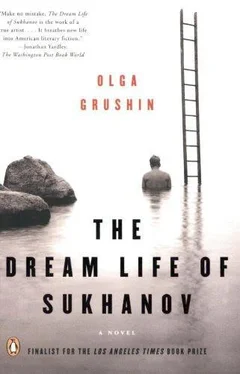“A play?” he said. “I didn’t know you were going to see a play.”
“The Cherry Orchard, at the Malyi,” she explained quickly. The bracelet would not stay closed. “Liusya called yesterday, she has a spare ticket.”
Mechanically he recalled the stray playbill that the wind had delivered into his hands.
“It’s supposed to rain later tonight,” he said. “Of course, you are taking the car?”
“No, Vadim asked for an evening off. Don’t worry, I’ll be fine.”
“You should get a taxi back,” he suggested, and added, after the briefest hesitation, “Have I seen those earrings before?”
“A hundred times,” she replied with impatience. “I must go, I’m running late.”
She vanished in a gleaming whirl of white and gray silk, leaving a faint smell of lily of the valley behind her, and he heard her high heels hastily traversing the evening silence before being erased by the bang of the front door. For a moment he debated leaning over the balcony and following her sonorous progress down the darkening street, but the paralyzing dread he had experienced in the yard of the decrepit convent still hovered somewhere in the vicinity of his heart, and, oddly reluctant to move, he turned back to his desk instead and busied himself with the stiff workings of the typewriter.
It was nearly eleven when, under the disapproving eye of the bronze Pegasus, he typed the last sentence of his meandering, rather inconclusive conclusion and, having wrested the page from the jaws of the antiquated contraption, added it to a thin stack of paper, vengefully stabbed the whole with a bent paper clip, and leaned back, considering. The article, he knew, said shamefully little, barely straying beyond a meager smattering of facts. Salvador Dalí was born in 1904 in a small Spanish town. The artist’s father was… Feeling suddenly in need of fresh air, Sukhanov rose, erased the light with a flick of the wrist, pushed open the balcony door, and stepped outside, into the pale, cool night.
It had indeed begun to drizzle a while ago. The roofs and the church domes glistened, and the city rustled and splashed in a soft, newly autumnal rhythm, rising and falling with the wet sounds of infrequent cars sliding down the streets, a distant chorus of young, tipsy voices bellowing nonsensical rhymes to the tune of the “Ode to Joy,” and the regular tapping of a walking stick belonging to a shrunken old man who every night shuffled slowly along Belinsky Street, before him a giant black dog on a straining leash. A thinning wraith of cigarette smoke drifted from somewhere above, and from below, meeting it in midair, floated a scrap of quiet conversation; Sukhanov heard a woman’s voice saying sadly, “We’ll have such a harvest of apples this year—and no one to eat them….” And all at once, as he stood listening and watching, breathing deeply, the night seemed to him so full of hidden movement, so poignantly alive, so unlike the habitually stuffy stillness hanging, thick and immobile, in the room at his back, that he felt startled, just as he might if, leafing through the sixth edition of his textbook on Soviet art theory, he discovered a poem printed discreetly between two authoritative paragraphs—some short verse with no apparent sense and yet full of lilting grace, gray and gentle like rain itself….
And in that lucid moment of surprise, a realization that for the last few days had lurked in the shadowy recesses of his thoughts forced its way to the surface. Something was happening to him—something strange, something, in fact, extremely unsettling—something that he was unable to explain, much less stop or control.
He was being assailed by his past.
Anatoly Pavlovich had always made a habit of gluing shut the pages of passing years, leaving at hand only some brief paragraphs for basic reference and a few heavily edited sunny patches for sentimental indulgence. Yet of late, memories were welling up in his soul, unbidden and relentless—and if at first he had found them to be pleasantly nostalgic sojourns into the pastel-tinted landscapes of his early childhood, now they were beginning to grow bleaker, harsher, more disturbing, disrupting the tranquillity of his mind, of his life, bringing him closer and closer to the forbidden edge of a personal darkness he had not leaned over in decades. This morning, in the yard, he had caught himself on the verge of reliving the horror of that day in November of 1943—that single moment of suspended belief followed by an immensity of pain that had swept through his soul, wiping it clean, and afterward, that persistent sensation of being lost, wordless, adrift, in a fog teeming with grotesquely sympathetic strangers. The mere possibility of drawing near that memory produced a chilly numbness in the back of his head, and he knew he could not, must not, let it torment him, not now, not after all these years…
Again he forced his thoughts away with a trembling sensation of stepping, just in time, from the brink of the abyss. The night pattered and glimmered before him. He touched his hand to his forehead, then, suppressing a shudder, moved to go back inside, when another waft of smoke drifted from above and something solid hit him squarely on the head and, bouncing off the banister, plummeted into the bushes. Incredulous, he followed it with his eyes: it was a loaf of bread. Then, craning his neck as far as his stoutness allowed, he looked up and found himself confronted with an unfamiliar old man in a red ski cap, hanging over the railing of the top, ninth-floor, balcony. The old man’s body was invisible from that angle, and his small round face, with its beady black eyes, wrinkled yellowish skin, and snub nose, bore a remarkable resemblance to an aging marmoset. Sukhanov had an uncanny impression of a withering balloon with monkey features drawn on it and a cigarette glued to its surface, floating in the smoky fog.
The man winked, and the impression was gone.
“Good news, comrade,” the man whispered conspiratorially. “I’ve just spoken to Lenin, and he wants me to tell you that everything’s going according to plan. It will start at four in the morning, on the dot. Be prepared.”
“I beg your pardon?” Sukhanov said frostily. “Are you talking to me?”
The old man beamed at him with sly benevolence. “Just continue following the instructions,” he whispered brightly. “And beware of our enemies. Our enemies are everywhere. Always watch your back.”
At that moment the ceiling of Sukhanov’s study shook with an onrush of thumping steps, and a woman’s shrill exclamation escaped into the night: “Papa, why aren’t you in bed? Have you taken your medicine?” The apparition cast a furtive glance over his invisible shoulder, then turned back to Sukhanov, flashed him a toothless smile, dropping his cigarette in passing, and vanished abruptly, as if someone had jerked the string tied to the balloon. An instant later the balcony door above banged shut, muting the sounds of an ensuing struggle.
Eight floors below, a red flicker of the cigarette flared up and went out.
Wiping the drizzle off his face, Sukhanov walked inside and bolted the door behind him with an unsteady hand, muttering, “Honestly, has everyone in this building gone insane?” After the luminous softness of the night, the darkness of the room blinded him unpleasantly. He moved to switch on the lamp—and immediately a multitude of shadows leapt away from him like a herd of frightened, misshapen beasts. For a minute, before his eyes adjusted to the light, he had a jarring sensation of actual creatures, insubstantial, colorless, weightless like dust balls, huddling in hidden corners and watching him stealthily—from under the sofa, from behind the door, from over the rim of the wastebasket…
He blinked, rubbed his temples. It was at once clear to him that he was not getting enough rest, that the disturbances of the past few days were turning his thoughts hazy and uncertain like a watercolor forgotten in the rain; and he suddenly longed to retire with a light book and let himself drift into dreamless sleep on the wave of some author’s inconsequential rambling. It took him a moment to recall what novel he was reading—a poor translation of an absurd Western title published in the difficult-to-obtain, subscription-only series Science Fiction, with a paranoid, unlikable hero who was constantly being tossed in and out of strangers’ bodies; all in all, just the sort of vapid reading he favored after a long, exhausting day of mental acrobatics. On the heels of that thought, however, came the realization that the volume still lay where he had abandoned it a few days before—on the nightstand in the bedroom.
Читать дальше








![Theresa Cheung - The Dream Dictionary from A to Z [Revised edition] - The Ultimate A–Z to Interpret the Secrets of Your Dreams](/books/692092/theresa-cheung-the-dream-dictionary-from-a-to-z-r-thumb.webp)



